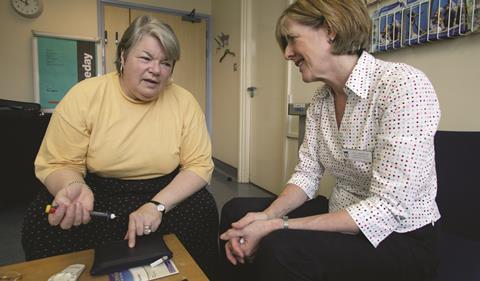Emily Watts outlines the recommendations of a new report on how hospital stays can be made safer for people living with diabetes and explains how hospitals that have adopted the recommendations are benefitting

Our Making hospitals safe for people with diabetes report, released in October, makes clear that there are still significant inadequacies in care for people living with diabetes during their hospital stays.
In just one year, 260,000 diabetes inpatients experienced a medication error during their hospital stay, and 9,600 people suffered a severe and dangerous episode of hypoglycaemia. This should not be happening.
These statistics tell a story in themselves, and were widely reported on when we released our report.
However, while we thought it important to communicate the extent of the problem, the coverage didn’t elaborate on its most important aspect, the recommendations we made to help hospitals improve diabetes inpatient care.
These recommendations all have been tried and tested in hospitals across the country, but are not yet standard practice.
The purpose of our report was to help hospitals realise that tested solutions to the problems surrounding diabetes inpatient care already exist. We want hospitals to take inspiration from each other, recognise good practice, and adopt the successes of other hospitals elsewhere in the country.
Our recommendations
Specialist multidisciplinary diabetes inpatient teams in all hospitals:
We know that specialist multidisciplinary diabetes inpatient teams reduce the length of hospital stays for people with diabetes and improve patients’ experiences. However, a quarter of hospital sites still don’t have a diabetes inpatient specialist nurse. In 2017, 235,000 people with diabetes should have been seen by a diabetes inpatient team during their hospital stay, but weren’t.
The diabetes inpatient team at Frimley Health Foundation Trust go on multidisciplinary ward rounds daily. This practice means that people with diabetes have access to specialist advice from consultants, diabetes specialist nurses, podiatrists and dietitians in one go. This recognises the complex needs of people with diabetes, and ensures they are being treated by specialists who understand their individual needs.
Knowledgeable healthcare professionals who understand diabetes:
In a survey of trainee doctors, they said that they lack confidence in diabetes management, meaning they’re unlikely to take the initiative to optimise glycaemic control. This low level of confidence and knowledge exists across frontline staff, and has been raised as a major concern by healthcare professionals and people with diabetes.
To remedy this, one of Diabetes UK’s Clinical Champions, Ruth Miller, created a simple 10 point training programme equipping healthcare professionals with the core competencies they need to provide safe and high quality care to diabetes inpatients. This programme can be adapted to suit the needs of hospital staff.
In a survey of trainee doctors, they said that they lack confidence in diabetes management, meaning they’re unlikely to take the initiative to optimise glycaemic control
Adopting Ruth’s training programme at Poole Hospital yielded tangible positive results. The 2015-16 National Diabetes Inpatient Audit shows that at Poole Hospital, following the adoption of the training programme, medication errors dropped from 46.9 per cent to 26.7 per cent, insulin administration errors dropped from 24.5 per cent to 13.3 per cent and prescription errors dropped from 38.8 per cent to 15 per cent.
These significant improvements could be replicated in trusts across the country if the 10 point training programme were adopted more widely.
Better support in hospitals for people to take ownership of their diabetes:
A common concern for people with diabetes in hospital is that they are not allowed to self administer insulin. The statistics on this speak for themselves. Almost one in three diabetes inpatients experienced a medication error during their hospital stay, and two fifths of those being treated with insulin at hospital experienced a wrong dosage.
People with diabetes should be supported, where appropriate, to take control of their own condition while they’re in hospital, and be given the opportunity to continue managing their own condition. This, alongside access to appropriate food at the right times, would help to minimise medication errors and keep people with diabetes stay safe during their hospital stay.
University Hospital Southampton developed an electronic review process to enable diabetes patients to self administer insulin. Medicines management technicians are responsible for the initial assessment, then the ward pharmacist checks that there are no clinical reasons why patients can’t self administer insulin.
People with diabetes should be supported, where appropriate, to take control of their own condition while they’re in hospital, and be given the opportunity to continue managing their own condition
They then prescribe an assessment level on the electronic prescription chart. At each drug round, a pop up appears for nurses to ensure they are still happy the patient can self administer.
This was piloted on four wards, and has been rolled out more widely in the trust following its success. Patients said the process meant they “got their insulin at the correct times”, “gave back independence” and “allowed them to make changes to doses as required”. Staff also saw improvements in care, with more patients getting their insulin on time.
We hope this has made clear a few simple, easily adoptable solutions which hospitals can use to improve diabetes inpatient care. We want hospitals to learn from each other’s successes, and become truly safe places for people with diabetes.

























No comments yet